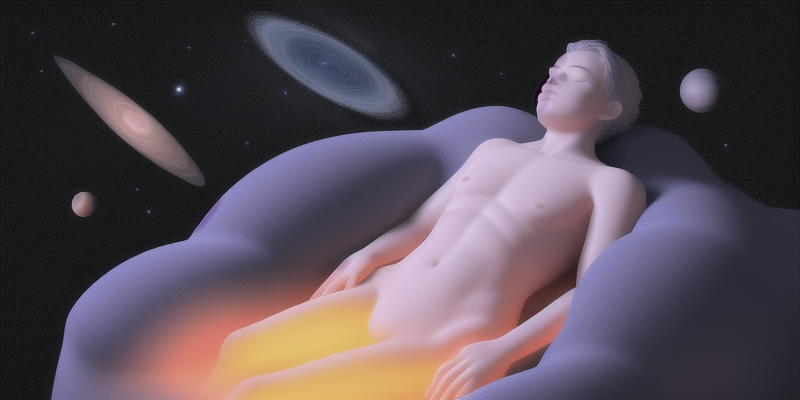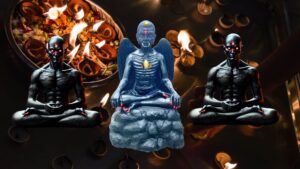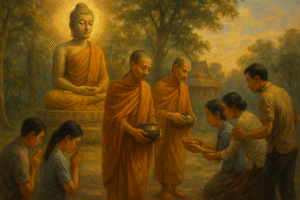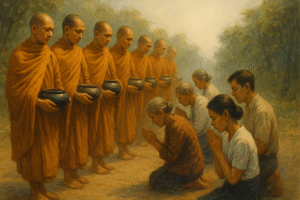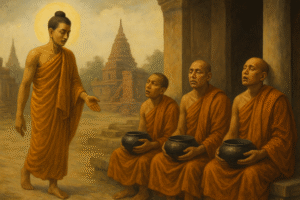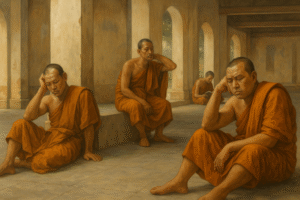The Anandamaya Kosha, the fifth and final sheath according to the ancient wisdom of the Upanishads. This sheath is often translated as the “sheath of bliss,” but to truly understand its significance, we must journey beyond the surface-level interpretation of this term.
The Ananda-Maya Kosha is associated with the state of deep, dreamless sleep. In this state, we are completely unaware of our physical bodies, our thoughts, our emotions, and even our individual identities. All that remains is a profound sense of peace, restfulness, and yes, bliss. But what is this bliss, and where does it come from?
The bliss of the Ananda-Maya Kosha is not the same as the fleeting happiness we experience when we satisfy a desire or achieve a goal. It is a deeper, more fundamental sense of well-being that arises not from external circumstances, but from the very nature of our own consciousness. It is the bliss of being itself, the joy of pure existence, unclouded by the dualities of pleasure and pain, gain and loss, success and failure.
in the realm of deep sleep, within the Ananda-Maya Kosha, our usual identities dissolve. We are no longer defined by our professions, our roles, our achievements, or our failures. The societal labels that often confine us in the waking state hold no sway in this domain. We are not mothers or fathers, teachers or students, artists or engineers. We are simply beings, existing in a state of profound rest and peace.
In this state, we are free from the judgments and expectations of others, and equally importantly, from our own self-judgments and self-expectations. The mind, with its incessant chatter and constant analysis, is silent. The body, with its demands and sensations, is at rest. The intellect, with its quest for understanding and control, is dormant.
There is no ‘I’ to be praised or blamed, no ‘me’ to succeed or fail, no ‘self’ to be accepted or rejected. There is only the pure experience of being, unmediated by the mind, body, or intellect. This is a state of pure consciousness, where the identity of the self dissolves into the blissful ocean of existence.
In this state, we get a glimpse of our true nature, beyond all identities and roles. We realize that we are not the limited, separate selves we often take ourselves to be, but the boundless, undivided consciousness that underlies all existence. This realization is the ultimate goal of the spiritual journey, the recognition of our true nature as the unchanging, eternal, blissful self.
Now, let’s engage in a conversation with ourselves. Ask yourself, “Have I ever experienced this state of bliss?” The answer is yes. We all have, in those moments of deep sleep when we are free from the turmoil of thoughts and desires. But the challenge is to bring that awareness of bliss into our waking state, to recognize that it is our true nature, not something that comes and goes.
So, how can we cultivate this awareness? The first step is to recognize that we are not the body, the mind, or the intellect. These are merely sheaths, layers that cover our true nature. They are objects of our awareness, not the source of it. We are the witness, the observer, the knower of these sheaths.
Next, ask yourself, “Who is it that is aware of the bliss in deep sleep?” The answer is, it is you, the unchanging consciousness that illuminates all experiences, including the experience of bliss. You are not the bliss, but the knower of the bliss. The bliss is an object of your awareness, just like the body, the mind, and the intellect.
Finally, realize that this bliss is not something to be attained or achieved. It is already there, within you, as your own true nature. It is not a state of mind, but the very ground of being. It is not something separate from you, but what you truly are, beyond all sheaths and layers of identity.
This understanding is the essence of the Ananda-Maya Kosha. It is the realization that you are not the changing phenomena of the world, but the unchanging consciousness that illuminates them. It is the recognition of your own true nature as bliss, not as a transient state, but as the eternal ground of being.
